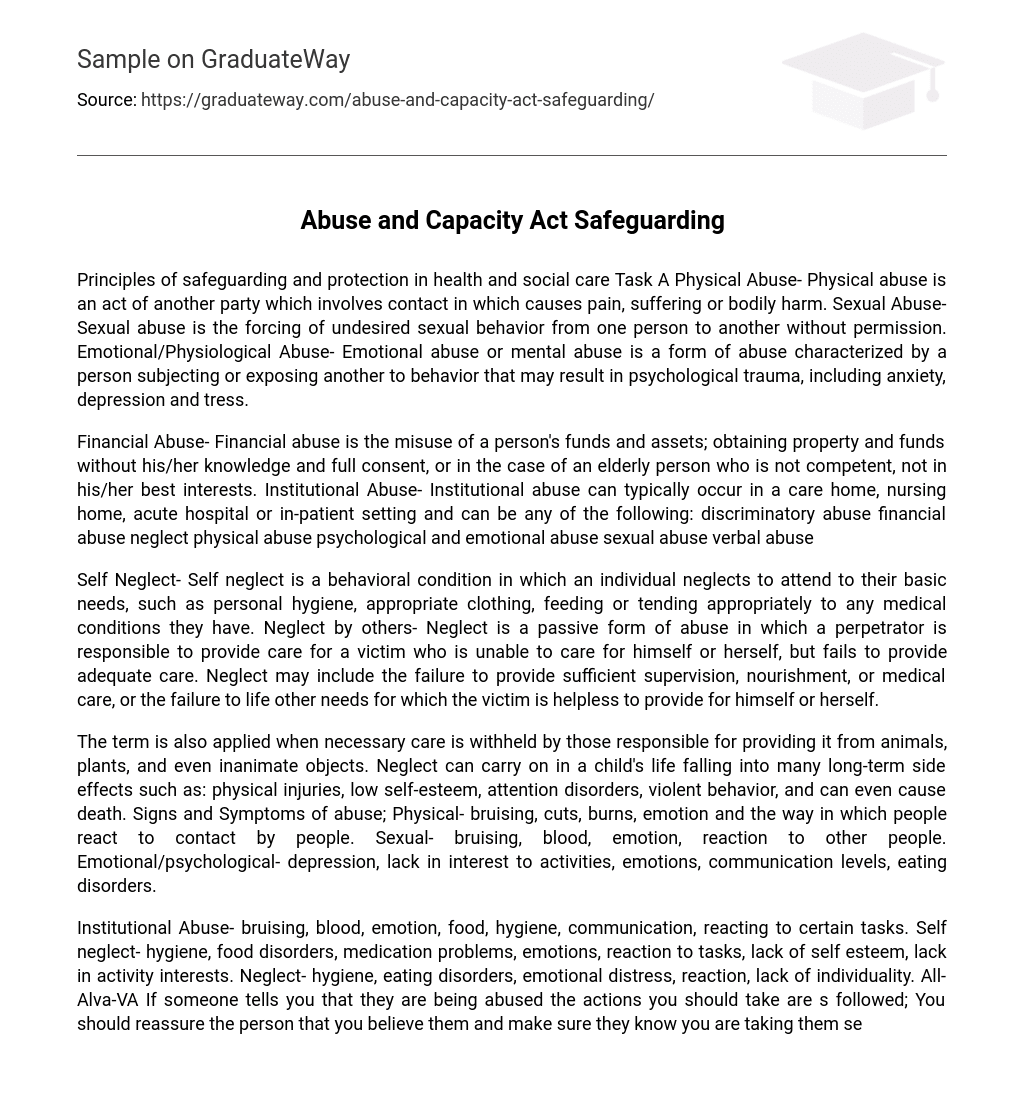Principles of safeguarding and protection in health and social care Task A Physical Abuse- Physical abuse is an act of another party which involves contact in which causes pain, suffering or bodily harm. Sexual Abuse- Sexual abuse is the forcing of undesired sexual behavior from one person to another without permission. Emotional/Physiological Abuse- Emotional abuse or mental abuse is a form of abuse characterized by a person subjecting or exposing another to behavior that may result in psychological trauma, including anxiety, depression and tress.
Financial Abuse- Financial abuse is the misuse of a person’s funds and assets; obtaining property and funds without his/her knowledge and full consent, or in the case of an elderly person who is not competent, not in his/her best interests. Institutional Abuse- Institutional abuse can typically occur in a care home, nursing home, acute hospital or in-patient setting and can be any of the following: discriminatory abuse financial abuse neglect physical abuse psychological and emotional abuse sexual abuse verbal abuse
Self Neglect- Self neglect is a behavioral condition in which an individual neglects to attend to their basic needs, such as personal hygiene, appropriate clothing, feeding or tending appropriately to any medical conditions they have. Neglect by others- Neglect is a passive form of abuse in which a perpetrator is responsible to provide care for a victim who is unable to care for himself or herself, but fails to provide adequate care. Neglect may include the failure to provide sufficient supervision, nourishment, or medical care, or the failure to life other needs for which the victim is helpless to provide for himself or herself.
The term is also applied when necessary care is withheld by those responsible for providing it from animals, plants, and even inanimate objects. Neglect can carry on in a child’s life falling into many long-term side effects such as: physical injuries, low self-esteem, attention disorders, violent behavior, and can even cause death. Signs and Symptoms of abuse; Physical- bruising, cuts, burns, emotion and the way in which people react to contact by people. Sexual- bruising, blood, emotion, reaction to other people. Emotional/psychological- depression, lack in interest to activities, emotions, communication levels, eating disorders.
Institutional Abuse- bruising, blood, emotion, food, hygiene, communication, reacting to certain tasks. Self neglect- hygiene, food disorders, medication problems, emotions, reaction to tasks, lack of self esteem, lack in activity interests. Neglect- hygiene, eating disorders, emotional distress, reaction, lack of individuality. All-Alva-VA If someone tells you that they are being abused the actions you should take are s followed; You should reassure the person that you believe them and make sure they know you are taking them seriously and that you want to hear what they have to say about it.
Ensure that they are safe and if immediate action is required then so do, for example. Calling the police to help keep someone safe. Do not discard of anything that could be used for evidence or might be needed for evidence. Don’t wash the person or clean the surrounding area, if they change their clothing, make sure it isn’t removed or washed. Make notes of exactly what was said and what you saw. If you were told about an event you should always make it clear in your notes who told you and also ensure that you add dates and times.
We should not investigate ourselves. We should not seek out the person alleged to have abused to the individual or confront them or talk to them Stay with the individual if they wish this and if it is safe to do so. Also, do not ask leading questions. F you suspect that someone is being abused, the best action to take is to file up a report on as to why you think they are and then inform your manager as she will aka the appropriate action, you can’t ask the person directly because if they wanted you to know 9 times out of ten they would tell you when they are ready.
The evidence that is given will be kept safe, it will only be seen by the appropriate people if necessary, like police or social workers. But it would be kept confidential to protect the individuals rights to privacy and confidentiality. There are several policies and procedures that set out requirements for safeguarding individuals, some of these are as followed; 1988 White Paper Modernizing Social Services stressed the importance of improving he protection for adults needing care and support.
Speaking up for Justice- Report highlighted the treatment of vulnerable or intimidated witnesses in the criminal justice system and the need to obtain “best evidence”. This resulted in their eligibility for special support measures under Part 2 of the Youth Justice and Criminal Evidence Act 1999 support by the Home Office Action for Justice and Achieving Best Evidence guidance. Public Interest Disclosure Act 2000 Human Rights Act 1998 placed positive duty upon “public bodies” to act immutability with the 0950 European Convention on Human Rights.





